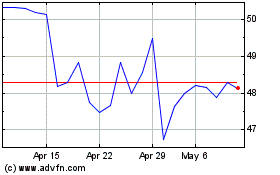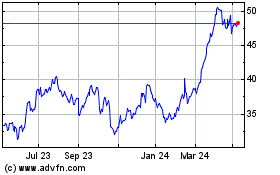By Rory Jones and Nick Kostov
This article is being republished as part of our daily
reproduction of WSJ.com articles that also appeared in the U.S.
print edition of The Wall Street Journal (January 4, 2020).
BEIRUT -- Carlos Ghosn, who is seeking to clear his name in
Lebanon, would face a very different path to vindication here,
where endemic corruption and the former auto executive's widespread
popularity could influence the outcome of a potential trial.
Mr. Ghosn, the former chief of auto makers Renault SA, Nissan
Motor Co. and Mitsubishi Motors Corp. recently fled Japan, where he
had been detained for more than a year on charges of financial
crimes that he has denied. He is now in Lebanon, his homeland,
where his lawyer says he wants to fight those allegations.
The two countries have no extradition treaty, and Lebanese
officials have indicated they won't send the executive back to
Tokyo. They have said, though, that if Japanese prosecutors turn
over evidence, Lebanon could hold a trial.
Mr. Ghosn has said the Japanese legal system was stacked against
him. More than 99% of those indicted for a crime are convicted,
according to official statistics. Japanese prosecutors have said he
would get a fair trial.
Lebanese law allows citizens, such as Mr. Ghosn, to be
prosecuted for crimes committed overseas, as long as the offense is
also a crime in Lebanon. Misappropriation of corporate funds -- one
of Japan's charges against Mr. Ghosn -- is a crime in Lebanon, said
Mazen Ghosn, a senior associate at Lebanese law firm Alem &
Associates who is not related to the former Nissan executive.
A trial in Lebanon would pose multiple challenges that could
play to Mr. Ghosn's advantage, legal experts said. First, it would
likely require Japanese prosecutors to hand over evidence of Mr.
Ghosn's alleged corruption to their Lebanese counterparts. Legal
experts said that would be surprising, as Japanese prosecutors have
worked on the case for months and are unlikely to trust Lebanon's
legal system.
"You cannot prosecute him if there is no case against him in
Lebanon," said Melhem Khalaf, head of the Beirut Bar Association.
"The file has to come from Japan."
Carlos Abou Jaoude, a lawyer for the former auto executive in
Lebanon, said in an interview that Mr. Ghosn "has one priority: to
prove his innocence. In order to prove his innocence, he needs to
be tried by a fair legal system. He wants badly for the trial to
take place."
He said he hoped Japanese prosecutors would share their case
with Lebanon. "If they are comfortable with their accusations and
evidence, this is an opportunity for them to prove their case," he
said.
Japanese lawyers said there is little chance that will happen.
"Mr. Ghosn was indicted because he was accused of violating the
laws of Japan. From the perspective of national sovereignty, it is
obvious that his guilt or innocence must be determined in the
Japanese justice system, " said Taichi Yoshikai, a professor of law
at Kokushikan University and a former prosecutor.
Former prosecutor Yoji Ochiai said Japan's prosecutors would
probably pause their current effort to begin a trial while
maintaining their indictments against Mr. Ghosn.
Japanese authorities have started a probe into the circumstances
of Mr. Ghosn's flight from bail. As part of that process, Lebanon
on Thursday said it received a notice via Interpol for the
provisional arrest of Mr. Ghosn. However, Lebanese prosecutors are
unlikely to bring charges against Mr. Ghosn based on the Interpol
notice alone, said Mr. Ghosn, the lawyer.
Also, legal proceedings against Mr. Ghosn would come at a
tumultuous moment for the country, which is witnessing a period of
political jockeying after its prime minister resigned in October
over antiestablishment protests. His designated replacement has yet
to form a government and the Ministry of Justice, which would be
involved in a case against Mr. Ghosn, currently has an acting
minister in charge.
Many Lebanese revere Mr. Ghosn as an exceptionally gifted
businessman who acted as an unofficial ambassador for the small
Middle East country. In a sign of how some Lebanese saw the charges
against Mr. Ghosn as an attack on the nation, billboards went up
around Beirut at the time of his ouster from Nissan, saying: "We
are all Carlos Ghosn."
A trial in Lebanon would struggle to win global legitimacy. The
courts are widely considered corrupt, believed to often allow
wealthy and influential individuals to buy protection. The country
placed 138 out of 180 countries on Transparency International's
Corruption Perception Index in 2018, versus a ranking of 18 for
Japan. That report said 65% of Lebanese citizens use social and
personal connections when dealing with courts and called the
phenomenon a "structural problem" that "poses a serious threat
to...the rule of law."
"Our system is corrupted. For sure in Japan it is more
transparent," said Ayman Raad, a Beirut-based lawyer who has
represented protesters against government corruption. A
spokesperson for Lebanon's presidential office didn't respond to
requests for comment on the fairness of the country's legal
system.
Mr. Abou Jaoude dismissed questions about Lebanon's ability to
stage a fair trial.
"It will be an independent judicial system trying the case based
on the accusations perpetrated by the prosecutor, and tried before
an impartial judge," he said.
There is also one new legal peril for Mr. Ghosn in Lebanon. On
Thursday, three Lebanese lawyers submitted a report to the public
prosecutor over Mr. Ghosn's travel to Israel, in his former role as
a top auto executive, according to Lebanon's state news agency.
Lebanon is technically in a state of war with Israel, and its
citizens are barred from entering the country or from conducting
business with Israeli-linked entities.
Ahead of Mr. Ghosn's escape, Lebanese officials said they
repeatedly wrote to Japanese officials asking that Mr. Ghosn be
handed over to Lebanon, but said they never received a response. A
Japanese Foreign Ministry spokesman declined to comment on the
Lebanese requests.
Should Lebanese prosecutors pursue charges, a trial would be
overseen by judges who could decide whether to make the proceedings
public or private. Japanese lawyers and prosecutors wouldn't
necessarily be involved in prosecuting unless Japan requested
access as part of the United Nations Convention Against Corruption,
an international treaty to which both Japan and Lebanon are
signatories, legal experts said.
Even if Lebanese courts were to allow the prosecution of an
alleged financial crime committed in Japan, other hurdles remain.
"You would have the massive practical problem of trying to
translate an entire prosecution from one system to another," said
Joshua Colangelo-Bryan, a white-collar defense attorney at Dorsey
& Whitney LLP.
--Corinne Ramey, Nazih Osseiran and Megumi Fujikawa contributed
to this article.
Write to Rory Jones at rory.jones@wsj.com and Nick Kostov at
Nick.Kostov@wsj.com
(END) Dow Jones Newswires
January 04, 2020 02:47 ET (07:47 GMT)
Copyright (c) 2020 Dow Jones & Company, Inc.
Renault (EU:RNO)
Historical Stock Chart
From Mar 2024 to Apr 2024

Renault (EU:RNO)
Historical Stock Chart
From Apr 2023 to Apr 2024
